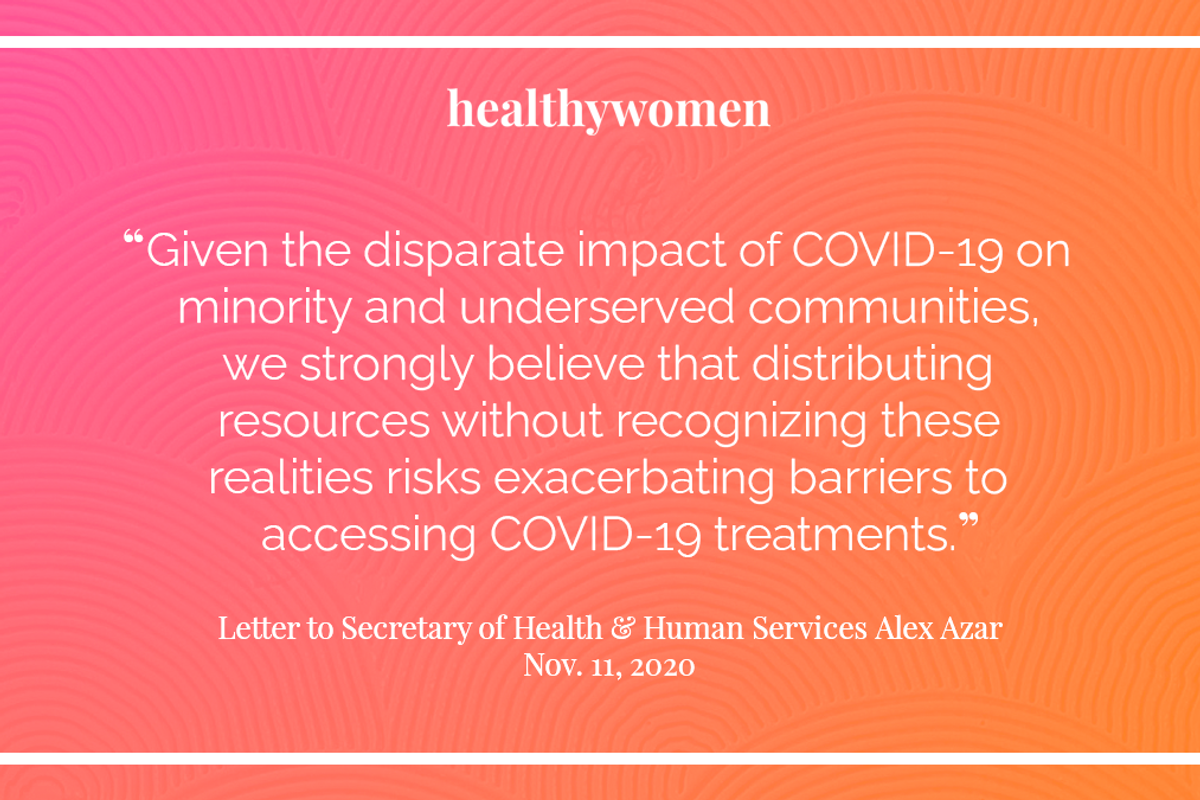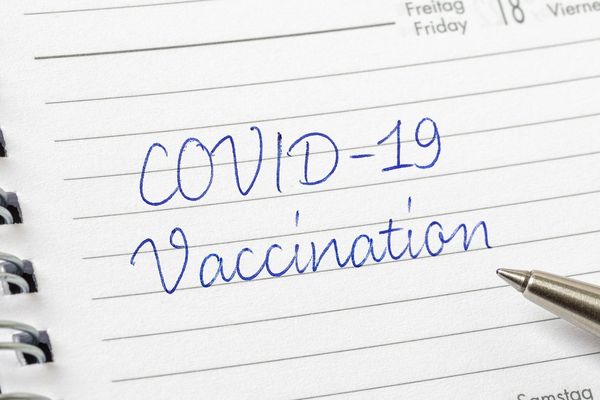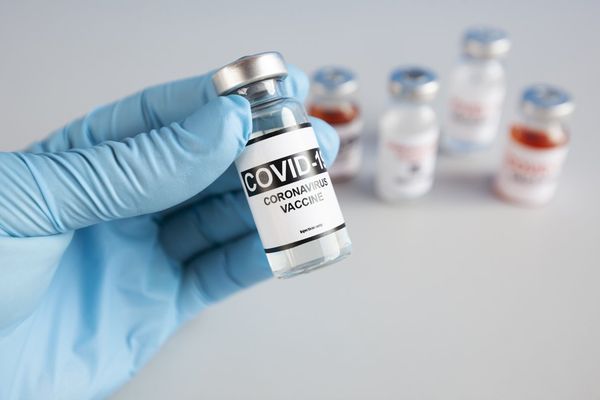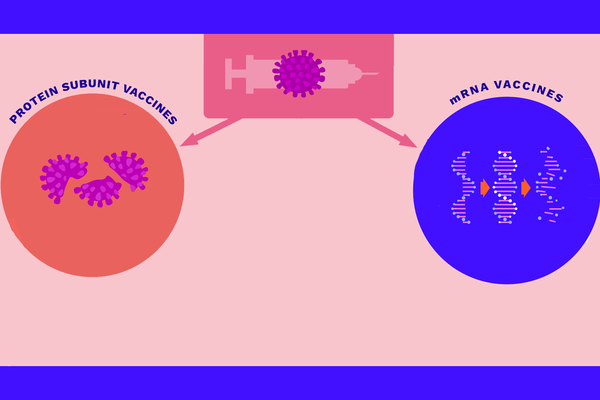November 11, 2020
The Honorable Alex Azar
U.S. Department of Health & Human Services
200 Independence Avenue, S.W.
Washington, D.C. 20201
Dear Secretary Azar:
The COVID-19 pandemic has exposed deep and systemic inequities in our health care system. Not only are members of minority and under-served communities more likely to suffer serious health consequences from SARS-CoV-2 infections, they disproportionately suffer economic hardships related to the pandemic. Our organizations have committed to advancing policy solutions to address these disparities head on, in hopes of not only mitigating the impact of the current pandemic, but also to promote a more equitable and just health care system in the future.
We stand united in calling for informed and thoughtful equity-focused resource allocation and distribution throughout the current pandemic. This environment has raised difficult questions around how scarce resources are allocated. Whether determining where to send physical product (vaccines, medicines, reagents, PPE, etc.) or COVID-19 funding, policy makers at all levels must consider equity and health disparities as they prioritize where these resources are sent.
Early evidence regarding distributions from the Provider Relief Fund (established by the CARES Act) suggests that the proportion of privately insured patients was more predictive of a health system receiving funding than the proportion of patients from minority communities. Conversely, researchers in Michigan developed a framework that would allocate initial scarce doses of Remdesivir based on criteria that explicitly recognized those areas bearing a disproportionate burden of disease: first doses should go to communities with the highest death rates and the highest rolling number of people on ventilators. This prioritization – in concert with deep trust building efforts - may help address underlying issues of trust in historically underserved or mistreated communities.
These and other examples from the last seven months have shown that the methodologies underlying allocation strategies are not at all neutral when it comes to health equity – they are powerful drivers that have the potential to correct or exacerbate health disparities in how they allocate scarce resources. Given the disparate impact of COVID-19 on minority and underserved communities, we strongly believe that distributing resources without recognizing these realities risks exacerbating barriers to accessing COVID-19 treatments.
We anticipate the importance of allocation strategies that prioritize equity will only grow as novel therapies to treat COVID-19 are hopefully approved in coming months. The United States government will likely play a key role in how the initial supply of these therapies is allocated across the country.
As your office prepares for the distribution of these products, we offer the following recommendations:
- Explicitly set promotion of health equity, in the context of the COVID 19 pandemic, as a goal of ASPR's allocation decisions.
- In consultation with relevant stakeholders and experts, establish evidence-based criteria that direct product to areas experiencing a disproportionate burden of disease or other resource constraint (as appropriate).
- Communicate these decisions and criteria openly to the public.
- Develop and clearly communicate the process by which these criteria could be modified if the burden of disease shifts to other populations or communities.
We note that in its report on the Framework for Equitable Allocation of COVID-19 Vaccine, the National Academies of Medicine created guiding principles to inform their deliberation. These guiding principles are also consistent with our recommendations, and we believe they could aid in developing similar strategies for distributing COVID-19 therapeutics.
We believe such an effort is necessary to ensure that ASPR's allocation decisions do not ignore the realities of health disparities in this country, or worse, inadvertently widen them by the selection of inappropriate metrics.
Our organizations stand ready to work with you in this effort and welcome further discussions about how your allocation strategies can better promote health equity.
Sincerely,
Alliance for Aging Research
American Cancer Society, Cancer Action Network
Association of Black Cardiologists
Biotechnology Innovation Organization
Black Women's Health Imperative
Genetic Alliance
Gerontological Society of America
Grapevine Health
Healthcare Ready
HealthyWomen
Hill Scientific and Public Affairs, LLC
Institute for Advanced Clinical Trials
Latinos for Healthcare Equity
Lupus Foundation of America
National Black Church Initiative
National Caucus and Center on Black Aging
National Health Council
National Hispanic Council on Aging
National Minority Quality Forum
National Minority AIDS Council
Preparedness and Treatment Equity Coalition
PXE International
Sick Cells
The Commonwealth Fund
The National Grange
Trust for America's Health
US Black Chambers, Inc.
cc: Dr. Robert Kadlec, Assistant Secretary for Preparedness and Response, HHS Cicely Waters, Director, Office of External Affairs, ASPR, HHS
References
Laurie Zephyrin et. al., "COVID-19 More Prevalent, Deadlier in U.S. Counties with Higher Black Populations," To the Point (blog), Commonwealth Fund, April 23, 2020
Yaphet Getachew, et. al., "Beyond the Case Count: The Wide-Ranging Disparities of COVID-19 in the United States," Commonwealth Fund, Sept. 10, 2020
Shanoor Seervai, "Why Are More Black Americans Dying of COVID-19?," June 26, 2020, in The Dose, produced by Joshua Tallman and Shanoor Seervai, podcast, MP3 audio, 22:29. https://doi.org/10.26099/9phb-x473
Parker Crutchfield, et. al., "Ethical Allocation of Remdesivir," The American Journal of Bioethics, July 27, 2020
National Academies of Sciences, Engineering, and Medicine. 2020. Framework for equitable allocation of COVID-19 vaccine. Washington, DC: The National Academies Press. https://doi.org/10.17226/25917.







